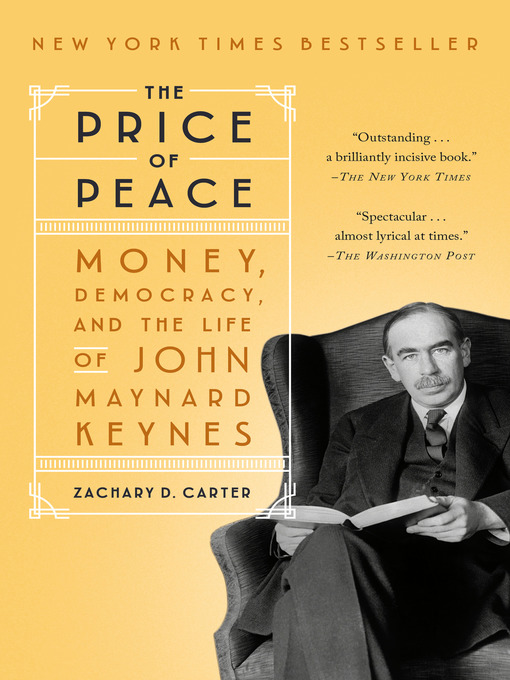
The Price of Peace
Money, Democracy, and the Life of John Maynard Keynes
کتاب های مرتبط
- اطلاعات
- نقد و بررسی
- دیدگاه کاربران
نقد و بررسی

March 15, 2020
Making an impressive book debut, journalist Carter offers a sweeping, comprehensive biography of economist, political theorist, and statesman John Maynard Keynes (1883-1946), one of the most influential figures of his time. As the author shows, Keynes' prescription for staving off financial disaster led to an important government post for the duration of World War I. "Dispatched to summits all over the world, called to parliamentary debates in the House of Commons, and welcomed into the social circles of the British political elite," Keynes became Great Britain's top financial adviser. Carter ably traces the evolution of his thought: He became disillusioned with classical economic theory, which held that market forces always would result in stability, and he came to realize that imperialism promoted inequality rather than spreading humanitarian values. In 1919, he mounted a "devastating attack" on the Treaty of Versailles, predicting with chilling accuracy that the treaty "would march Europe to economic ruin, dictatorship, and war." In his many economic treatises, Keynes tried to synthesize "the practical, risk-averse, anti-revolutionary conservatism" of Edmund Burke and "the radical democratic ideals advanced by Rousseau." Although he became hugely wealthy and enjoyed the privileges of his class, at heart, Carter notes, Keynes was an idealist who tried "to democratize the trappings of ruling-class life." In his personal life, Keynes was a sometimes admired, sometimes cattily dismissed member of the Bloomsbury group of artists and writers, counting among his friends Virginia and Leonard Woolf, Lytton Strachey, and Duncan Grant. He had many male lovers until he met, and married, the dazzling ballerina Lydia Lopokova. Assessing his subject's legacy, Carter asserts that Keynesianism "is not so much a school of economic thought as a spirit of radical optimism" that "was for a time synonymous with liberal internationalism--the idea that shrewd, humane economic management could protect democracies from the siren songs of authoritarian demagogues and spread peace and prosperity around the globe." An absorbing, thoroughly researched life of a singular thinker.
COPYRIGHT(2020) Kirkus Reviews, ALL RIGHTS RESERVED.

Starred review from April 1, 2020
In this illuminating and well-researched book, Carter, senior reporter at HuffPost, not only explains Keynesian economics, but also provides a comprehensive portrait of British economist John Maynard Keynes (1883-1946). Carter begins by describing Keynes's personal life, including his childhood and his avant-garde circles of friends, along with the events and experiences that shaped his thinking. He also shows the development of Keynes's economic theories--many of his ideas have influenced modern economics throughout the 21st century and have implications in today's political and economic climates. One central idea is that global and individual country peace and prosperity cannot be obtained if there are trade imbalances and other significant financial and monetary disparities between countries; an environment of winners and losers, or creditors and debtors, only creates strife. Carter explains how Keynes advocated for better strategies to achieve peace and prosperity. He also enhances the work by providing one the best in-depth discussions of the gold standard. VERDICT Academic readers who want more biographical information about Keynes will be captivated by this depiction of his life and thinking.--Caroline Geck, Somerset, NJ
Copyright 2020 Library Journal, LLC Used with permission.

Starred review from April 6, 2020
Journalist Carter debuts with a compassionate and richly detailed exploration of the life and legacy of economic theorist John Maynard Keynes (1883–1946). Seeking to assemble Keynes’s disparate views on politics, money, art, war, and culture into the “singular, definitive philosophical statement” he never produced in his lifetime, Carter delves into The General Theory of Employment, Interest, and Money (1936) and other writings to explain Keynes’s theories on public welfare, deficit spending, and financial markets. He also documents Keynes’s public support of “deficit-financed expansion” during the New Deal, and credits Keynes with securing government funding for the restoration of the Royal Opera House at Covent Gardens after WWII. On a more personal note, Carter describes Keynes’s involvement with the Bloomsbury group, and the shock of confidants Virginia Woolf and Lytton Strachey at his “wild, impossible love” with Russian ballerina Lydia Lopokova (Keynes’s previous romantic relationships had been with men). Tracing the impact of Keynesian economics on modern U.S. politics, Carter sketches the policies of every president from Kennedy through Obama, and explores how Keynes’s “spirit of radical optimism” animates contemporary efforts to arrest the “global slide into authoritarianism.” Carter makes complex economic concepts accessible, and eloquently untangles Keynes’s many personal and professional contradictions. This is an essential portrait of the economist and the man.

Starred review from May 1, 2020
Although British economist Keynes is mostly remembered for the theory that bears his name, in his first book, journalist Carter reveals that his ideas have far more to offer to today's world of rickety economies and creeping authoritarianism. Keynes loathed authoritarian rule and strove for a cosmopolitan good life for all. His theories reflected the events of his time, but he was always pragmatic, devising new tactics and attacking established policies that stood in his way. In this sweeping intellectual biography, Carter traces Keynes' career from his first forays into public policy during WWI, through the bumpy 1920s, and the Great Depression, to its end in the behind-the-scenes negotiations of WWII. He vividly describes Keynes' world, which encompassed both European realpolitik and the Bloomsbury Group, and illustrates how his academic, cultural, and political activities influenced his ideas. Carter also covers how Keynes' theories were transformed into the economic prescriptions we know as "Keynesianism" (Keynes wouldn't have approved), how Keynesianism was politicized in the UK and especially the U.S., and why, despite Keynes' emphasis on an economics that allowed for the good life, its political influence waned by the end of the twentieth century. Carter's timely study is highly recommended.(Reprinted with permission of Booklist, copyright 2020, American Library Association.)

























دیدگاه کاربران